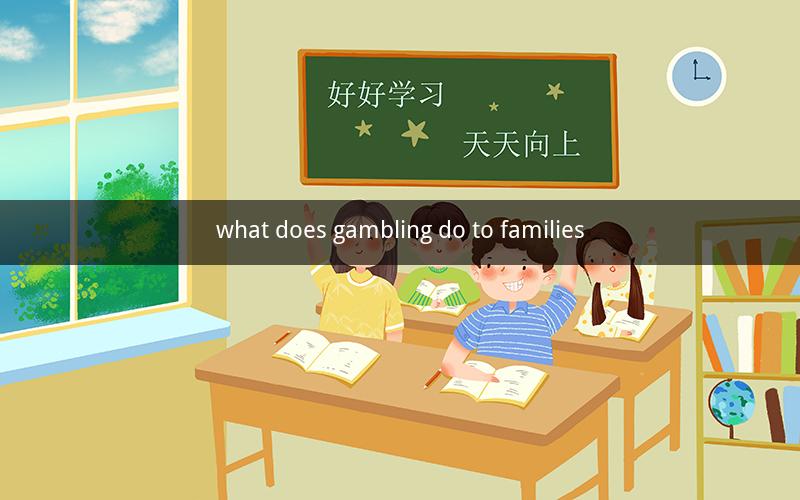
The Impact of Gambling on Families
Table of Contents
1. Introduction to Gambling
2. Types of Gambling
3. The Psychological Effects on Family Members
4. Financial Consequences
5. Social and Community Implications
6. Support and Resources for Families
7. Conclusion
1. Introduction to Gambling
Gambling has been a part of human culture for centuries, with its origins traced back to ancient civilizations. In modern society, gambling has become increasingly popular, with various forms available to the public. From lottery tickets to online casinos, the options are limitless. However, what does gambling do to families? This article delves into the various ways in which gambling can affect family dynamics and relationships.
2. Types of Gambling
Gambling can take many forms, including lottery, sports betting, casino games, poker, and bingo. Each type of gambling has its unique risks and potential consequences for individuals and their families.
3. The Psychological Effects on Family Members
Gambling addiction can have severe psychological effects on family members. Some of the common psychological impacts include:
- Stress and anxiety: Family members may experience heightened levels of stress and anxiety as they worry about their loved one's gambling habits.
- Depression: Witnessing a loved one struggle with gambling addiction can lead to feelings of depression, as family members may feel helpless and overwhelmed.
- Guilt and shame: Family members may feel guilty or ashamed for not being able to control the situation or for enabling the addiction.
- Conflict and anger: Arguments and conflicts can arise within the family, as loved ones may clash over their beliefs regarding gambling and addiction.
4. Financial Consequences
Gambling addiction can have significant financial consequences for families. Some of the financial impacts include:
- Loss of income: A gambling addict may spend hours or even days at a time gambling, leading to a loss of income and potential job security.
- Debt: Families may accumulate significant debt as the addict continues to borrow money to finance their gambling habits.
- Divorce: Financial strain can lead to marital problems, potentially resulting in divorce.
5. Social and Community Implications
Gambling addiction can also have social and community implications. Some of these implications include:
- Increased crime rates: Individuals struggling with gambling addiction may turn to illegal activities to finance their habits, leading to higher crime rates in the community.
- Strained relationships: Friends and family members may distance themselves from an addict, leading to social isolation and loneliness.
- Negative reputation: An addict's behavior can negatively impact the family's reputation within the community.
6. Support and Resources for Families
For families affected by gambling addiction, seeking support and resources is crucial. Here are some resources and support systems available:
- Gamblers Anonymous: This is a fellowship of men and women who share their experience, strength, and hope with each other so they may solve their common problems and help others to do the same.
- National Council on Problem Gambling: This organization provides a wealth of resources, including hotlines, chat rooms, and workshops for families affected by gambling addiction.
- Therapy and counseling: Professional therapists and counselors can help family members cope with the psychological effects of gambling addiction.
7. Conclusion
Gambling addiction can have a profound impact on families, affecting their psychological well-being, financial stability, and social relationships. It is crucial for families to recognize the signs of gambling addiction and seek support and resources to overcome this challenge. By working together, families can rebuild their lives and move forward towards a healthier future.
Questions and Answers
1. What is gambling addiction?
Gambling addiction is a behavioral disorder characterized by the inability to control the urge to gamble, despite negative consequences.
2. Can gambling addiction affect children?
Yes, children of gambling addicts may experience psychological and emotional distress due to the stress and turmoil in their family.
3. How can I tell if my loved one has a gambling problem?
Signs of a gambling problem include secretiveness, increased time spent on gambling activities, borrowing money, and neglecting responsibilities.
4. Is it possible for someone to recover from gambling addiction?
Yes, with proper treatment and support, many individuals can recover from gambling addiction and lead a fulfilling life.
5. What should I do if I suspect my child is gambling?
Talk to your child about their gambling habits, express your concerns, and encourage them to seek professional help if necessary.
6. How can I help a family member who is struggling with gambling addiction?
Offer support, encourage them to seek professional help, and be patient as they work through their addiction.
7. Are there any legal consequences for gambling addiction?
While gambling addiction itself is not illegal, the illegal activities some individuals may engage in to finance their habits can lead to legal consequences.
8. How can I protect my family from the effects of gambling addiction?
Educate yourself and your family about gambling addiction, establish open communication, and seek support from support groups and professionals.
9. What is the most effective treatment for gambling addiction?
The most effective treatment often involves a combination of therapy, counseling, and support groups.
10. Can a family recover from the damage caused by gambling addiction?
Yes, with time, patience, and support, families can heal and rebuild their lives after overcoming gambling addiction.